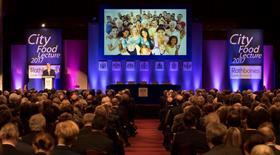
The 2017 City Food Lecture took place at London's Guildhall last night (21 February), with the issue of reconnecting consumers with the food supply chain very much at the top of the agenda.
The lecture was penned by Chris Elliott, a professor of food safety and founder of the Institute for Global Food Security at Queen’s University Belfast, who addressed the question: ‘Does it matter where our food comes from?’
It was delivered on Elliott's behalf by Michael Bell, executive director of the Northern Ireland Food and Drink Association and a Fellow of the Institute of Food Science and Technology.
Elliott highlighted the fact that, in his belief, very few UK consumers choose to actively seek out British products, valuing choice over provenance - an attitude that has led to the growth of an increasingly complex food supply system, a large import-export trade gap and a growing disconnect between the supply chain and the end customer.
'It could be argued that we are sacrificing our UK food and drink industry to ensure lower prices, greater choice and long-term political stability,' he noted.
The country's food supply is facing a number of threats, Elliott explained, such as climate change and the issue of 'food fraud' - namely sourcing from organisations around the world who do not adhere to the highest agricultural or labour standards.
'We are not considering the long-term needs of the UK,' he said. 'Climate change, without doubt, will lead to widespread commodity shortages in the future. Also, the threat of consuming food that has involved food fraud, such as slave labour, is increasingly high. To think that we are immune to these things in the UK is simply not true.'
Brexit was also touched upon, with Elliott calling it 'the great unknown'. He did however predict leaving the EU would change trading habits, offer industry opportunities, but also offer greater opportunities for criminal activity in the food supply chain.
Having established that consumers are growing ever more out of touch with the food industry, Elliott suggested how to bring about a crucial reconnection.
'We must start with the youngest children, and ensure that food is part of their education,' he explained. 'Also, we must stop talking about consumers as a whole, and start talking about the needs of individuals.
'The global food system has had a negative impact on our links with local production. We must inspire the next generation to see the primary food industry as a desirable place to be,' he added.
Panel
The lecture was followed by a panel debate chaired by businesswoman Margaret Mountford and featuring LEAF chief executive Caroline Drummond, writer and broadcaster Tim Hayward and Tesco group quality director Tim Smith.
On the issue of reconnecting consumers with the industry, Drummond said that education and showcasing the best of what the industry had to offer were key.
'We must get people oto farms so that farmers can tell the story behind our food,' she outlined. 'We will build trust by getting face-to-face with consumers. Let us show them our passion, our integrity and how safe our work really is.'
On provenance and seasonality, Smith and Hayward agreed that while the idea of buying local was in consumer's minds, it would be nigh-on impossible to move back to a seasonal-only market.
'Consumers are interested in provenance, but it's simply not possible to write off exports and go back to a seasonal market,' said Hayward. 'People want a complete choice, all year round. We have a complex market and it's not going to change, the idea is simply too idealistic.'
'Of course, people will not buy tasteless food,' Smith added. 'The fact that they want the freshest food possible often means certain imports are not viable. It is crucial to ensure any food brought in from outside the UK is of high quality and has been sourced using good practices.'






No comments yet